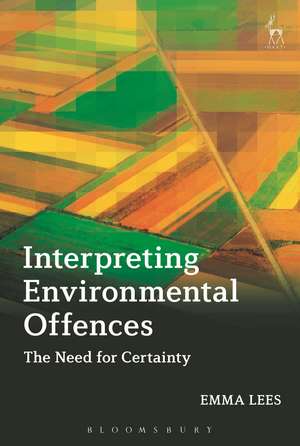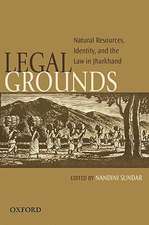Interpreting Environmental Offences: The Need for Certainty
Autor Emma Leesen Limba Engleză Paperback – 23 aug 2017
| Toate formatele și edițiile | Preț | Express |
|---|---|---|
| Paperback (1) | 271.58 lei 6-8 săpt. | |
| Bloomsbury Publishing – 23 aug 2017 | 271.58 lei 6-8 săpt. | |
| Hardback (1) | 569.22 lei 6-8 săpt. | |
| Bloomsbury Publishing – 27 mai 2015 | 569.22 lei 6-8 săpt. |
Preț: 271.58 lei
Preț vechi: 348.61 lei
-22% Nou
Puncte Express: 407
Preț estimativ în valută:
51.97€ • 54.06$ • 42.91£
51.97€ • 54.06$ • 42.91£
Carte tipărită la comandă
Livrare economică 14-28 aprilie
Preluare comenzi: 021 569.72.76
Specificații
ISBN-13: 9781509916030
ISBN-10: 1509916032
Pagini: 256
Dimensiuni: 155 x 234 x 18 mm
Greutate: 0.41 kg
Ediția:NIPPOD
Editura: Bloomsbury Publishing
Colecția Hart Publishing
Locul publicării:London, United Kingdom
ISBN-10: 1509916032
Pagini: 256
Dimensiuni: 155 x 234 x 18 mm
Greutate: 0.41 kg
Ediția:NIPPOD
Editura: Bloomsbury Publishing
Colecția Hart Publishing
Locul publicării:London, United Kingdom
Caracteristici
The author argues that there is much uncertainty surrounding the interpretation of these rules and proposes that a primarily linguistic approach to interpretation should be adopted. She then goes on to outline a useful framework through which a solution to the certainty problem can be reached.
Notă biografică
Emma Lees is a University Lecturer in Property and Environmental Law in the Department of Land Economy, University of Cambridge.
Cuprins
1. Introduction I. Structure II. Motivation, Scope and Methodology 2. Environmental Criminal Law in Context I. Property and Environmental Law II. Human Rights and the Environment III. Questions of Risk IV. Jurisdictional Overlap-National Law and EU Law V. Interpretation and Judicial Reasoning VI. Criminal Law and Environmental Law VII. Conclusion 3. Legal Certainty I. Defining Legal Certainty II. Transparency and Accessibility in National and European Case Law III. Certainty in Environmental Law IV. Conclusions 4. Waste, Nature Conservation and Contaminated Land: The OffencesI. Waste II. Contaminated Land III. Nature Conservation5. Uncertainty in Interpretation I. Uncertainty in Practice II. The Teleological Approach in the Courts 6. Identification of the Cause of Uncertainty: The Regulatory Culture I. Approach of the ECJ II. Administrative Approach III. The Ambiguous Role of the Courts IV. Academic Approaches V. Conclusions 7. The Solution: A Change in Approach to Interpretation I. Linguistic Analysis II. Mischief III. Seeing the Rules as Part of a Framework IV. Explanatory and Pre-Legislative Materials V. Ambiguity-Aims as a Last Resort VI. Conclusions 8. Practical Implementation of the Solution I. Environmental Principles II. Legal Barriers to Taking Such an Approach and Overcoming Them III. Examples in Practice 9. Conclusions I. Property/Environmental Law II. Human Rights and the Environment III. Question of Risk IV. Jurisdictional Overlap V. Interpretation and Legal Reasoning VI. Environmental/Criminal Law VII. Conclusion
Recenzii
Lees makes a significant contribution to environmental law discourse, which is academically stimulatingand has the potential to be practically important.













